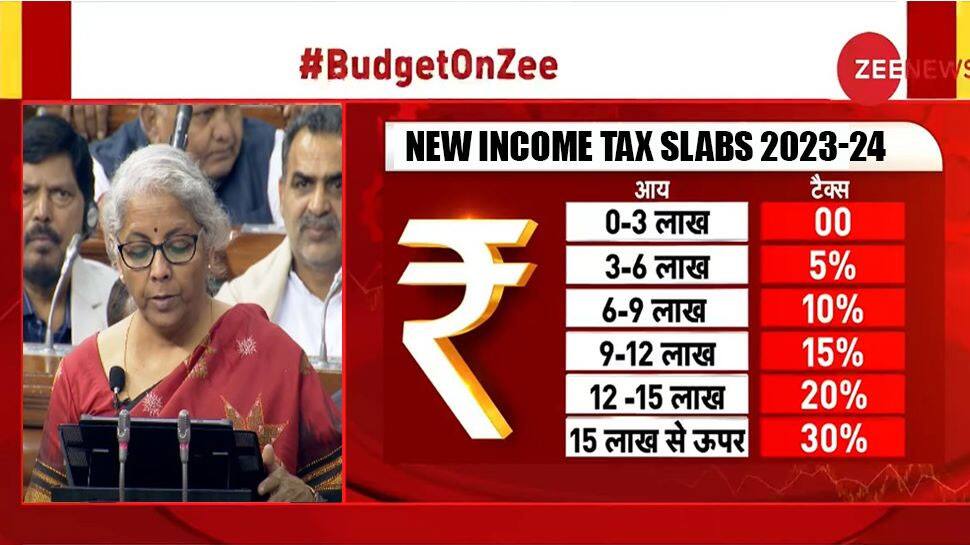Union Budget 2023 Overview: FM Sitharaman's Big Income Tax Sop for Middle-class, Salaried Individuals to Increase Available Disposable Income
In her shortest budget talk, which lasted 87 minutes, FM Nirmala Sitharaman delivered the Union Budget for FY 2023–24 and placed a significant emphasis on digital public infrastructure, according to industry analysts.
Trending Photos
)
New Delhi: The Union Budget 2023 has brought welcome tax relief for the salaried middle class, which will also benefit senior citizens and their households. Finance Minister Nirmala Sitharaman's Budget announcement on increasing the tax bracket aims at putting in a little extra money at the hands of the people.
Union Budget 2023 Places Strong Emphasis on Digital Public Infrastructure
Industry experts believe that the Union Budget for FY 2023-24, presented by the FM has placed a strong emphasis on digital public infrastructure, in her shortest budget address, which lasted 87 minutes.
With the introduction of Entity DigiLocker, which will securely store and share essential documents specifically for MSMEs, start-ups, large enterprises, and charitable organizations, and streamline KYC processes, all on one platform –the Finance Minister will enable more Fintech innovative services, said experts.
Union Budget 2023: Increasing the Capex Intensity Inarguably the Sweetest Spot
Amar Ambani, Group President and Head- Institutional Equities, YES SECURITIES applauded FM Sitharaman’s Budget stating that increasing the capex intensity budgeted by her was inarguably the sweet spot.
“Spurred by a tax bonanza, thanks to formalization of the economy and inflation, the FM accelerated the capex run-rate. Apart from the central investment, states have been allocated a higher share of money with incentives in place to generate a higher spend on capex,” Ambani added.
Union Budget 2023: No Tax On Income Up To Rs 7 Lakh, Five Slabs Instead of Six

For tax payers earning up to Rs 7 lakh in annual income, it would not be subject to tax. Due to rebates under both the old and new tax systems, people with total annual incomes up to Rs 5 lakh no longer pay any taxes, the FM had observed in her Budget presentation. In the new tax system, this rebate cap has been increased to Rs 7 lakh. For individuals who choose the new tax regime and get rebate up to Rs 7 lakh on income, a move will result in savings of Rs 33,800. Up to Rs 10 lakh in income would result in savings of Rs 23,400, while up to Rs 15 lakh in income would result in savings of Rs 49,400, said the FM
Saurabh Garg, Co-Founder and CBO, NoBroker.com said that the increased market liquidity would undoubtedly result from the tax refund limit increase to Rs 7 lakh and the overall tax structure decrease. People would now have more disposable income to save and invest in homes, significantly enhancing the sector's growth possibilities.
The FM has also lowered the number of tax slabs from previous six to five. Under the amended concessional tax scheme, there would be no tax on income up to Rs 3 lakh while for income between Rs. 3-6 lakh, taxpayers would be subject to a 5% tax rate, Rs. 6-9 lakh to a 10% tax rate, Rs. 9-12 lakh to a 15% tax rate, Rs. 12-15 lakh to a 20% tax rate, and Rs. 15 lakh and beyond to a 30% tax rate.
Union Budget 2023: Significant Relief under the New Proposed Tax System
Vijay Chandok, MD & CEO, ICICI Securities has said that all taxpayers will see significant relief under the new proposed tax system, but middle-class individuals will benefit most because it will increase their available disposable income. They would be able to take advantage of the growing strength of the Indian economy and explore new investment opportunities as a result.
Union Budget 2023: FM Stayed on Course of Fiscal Consolidation Path
FM Sitharaman has also stayed on the course of the fiscal consolidation path. In her Budget Speech for 2021-22, Sitharaman had announced that we plan to continue the path of fiscal consolidation, reaching a fiscal deficit below 4.5 per cent by 2025-26 with a fairly steady decline over the period. The Finance Minister has said that her Ministry has adhered to this path, and reiterated her intention to bring the fiscal deficit below 4.5 per cent of GDP by 2025-26.
Kalpesh Desai, Partner- Deal Advisory, M&A and PE Tax, KPMG in India has lauded the FM for performing “a fine balancing act by ensuring that the fiscal deficit remains within overall target and at the same time, the economy gets the right push to remain the fastest growing economy amongst the major economies.”
Union Budget 2023: Industry Hails FM Sitharaman’s Budget for Appropriately Prioritizing Growth
The Industry has also hailed the Finance Minister for appropriately prioritizing growth in light of the difficult macroeconomic context of declining global growth and tightened financial conditions.
Stay informed on all the latest news, real-time breaking news updates, and follow all the important headlines in india news and world News on Zee News.
Live Tv







)
)
)
)
)
)
)
)
)
)
